On 23 August 2014, UM held the first-ever convocation on its new Hengqin campus to kick off the 2014/2015 academic year. This ceremony symbolised a transformative moment for UM as it was finally able to shed its image as ‘a campus-less university’. The new campus, abundant with greenery and beautiful scenery, provided a brand-new environment for students. During the opening ceremony, UM faculty dressed in academic attire greeted around 2,000 new students. Several months later on 20 December 2014, which was the 15th anniversary of Macao’s return to the motherland, a notable moment occurred when President Xi Jinping visited UM and engaged with its students. He encouraged them to work hard and aim to excel beyond their professors.
Committed to talent development
The year 2014 was a crucial year for UM as it relocated to a new campus. In addition, this year marked a turning point in UM’s talent development strategy. Since the relocation, the university has refined its approach to talent development across all study levels, from undergraduate to doctoral. It has adopted a whole-person educational model and the ‘P.I.C.K.’ research development strategy, which focuses on Problem Orientation, Interdisciplinary Interaction, Collaborative Innovation, and Knowledge Translation, in order to nurture innovative talent and advance cutting-edge research.
UM adopts a ‘4-in-1’ education model in undergraduate education, which integrates discipline-specific education, general education, research and internship education, and community and peer education. The university’s residential college system, an integrated educational platform, incorporates this approach into faculty-led teaching, offering undergraduates a dynamic learning experience that promotes whole-person development. The relocation has enabled the number of UM’s residential colleges to grow from two to ten, encompassing about 20 per cent of the campus area. In 2020, UM reformed its residential college education and introduced an upgraded 2.0 version education model, which emphasises cultivating seven key competencies: responsible citizenship, global competitiveness, knowledge integration, teamwork and collaboration, service and leadership, cultural engagement, and a healthy lifestyle. These goals seek to enhance students’ essential soft skills in tandem with professional knowledge.
Six years ago, UM Rector Prof Yonghua Song emphasised in his inaugural address the importance of postgraduate education. According to him, in the few years that followed, UM prioritised knowledge integration at the master’s level by developing innovative and interdisciplinary programmes to produce graduates who address societal needs. At the doctoral level, the focus on collaborative innovation encourages an environment featuring openness, cooperation, and resource sharing. This initiative fosters interdisciplinary academic exchanges, propelling cutting-edge research for the greater good.
Dr Zeng Wenliang, currently a UM Macao Fellow at the UM Institute of Microelectronics, completed his bachelor’s, master’s, and doctoral studies at UM. He explains that during his undergraduate years, he had the opportunity to explore various fields in order to find his research interests. As he moved into postgraduate studies, the emphasis shifted to building knowledge and fostering innovation within his chosen field. He also highlights that his professors didn’t just encourage theoretical advancements; they also encouraged him to apply his research in practical settings.
Aymo Khoo, a Malaysian student, is pursuing a master’s degree in financial technology at the UM Faculty of Science and Technology. He earned a bachelor’s degree in finance from the UM Faculty of Business Administration. He shares that interdisciplinary learning was much more challenging than he had expected. However, the rewards he has gained have far exceeded his expectations. During his time at UM, Aymo has not only acquired the skills to integrate financial concepts into software development, but has also overcome the challenges of interdisciplinary learning.
Refining disciplines and programme structures
Over the past decade, UM’s student population has grown from just around 8,000 individuals to more than 13,500. Moreover, the university has introduced about 10 new academic departments and nearly 20 new degree programmes. These include specialised fields such as Macao legal studies, Chinese law and global legal studies, international integrated resort management, applied physics and chemistry, public health and medicinal administration, philosophy and religious studies, biomedical sciences, pharmaceutical sciences and technology, arts, as well as ocean science and technology. Today, the university offers around 120 programmes across doctoral, master’s, bachelor’s, and postgraduate certificate/diploma levels.
Many UM degree programmes have gained international accreditation, serving as a testament to the university’s high teaching quality. For instance, the Bachelor of Science in Accounting programme is accredited under the Hong Kong Institute of Certified Public Accountants’ Qualification Programme. Moreover, the Bachelor of Science in Computer Science programme and other bachelor’s degree programmes in engineering have received full accreditation from the Hong Kong Institution of Engineers, and have subsequently been recognised by all signatories to the Seoul Accord and the Washington Accord. Furthermore, the Faculty of Business Administration holds the ‘Triple Crown’ status, accredited by the Association to Advance Collegiate Schools of Business (AACSB), the Association of MBAs (AMBA), and the EFMD Quality Improvement System (EQUIS), underscoring its excellence in teaching, research, and academic management.
Strengthening students’ sense of national identity
UM strengthens students’ sense of national identity through various initiatives. For example, the university established its National Flag Team in 2018, marking the first university national flag team in Macao. On 26 May 2018, the team conducted its inaugural flag-raising ceremony in the presence of over 800 students and faculty members, becoming the first public university in Macao to do so. Since then, flag-raising ceremonies have become regular events on major occasions, including congregation and convocation days, National Day, the anniversary of the Macao SAR, and the first day of the new year.
UM’s general education curriculum for undergraduate students includes a mandatory course titled ‘Ethics, Values, Laws, and Society’. This course, delivered by experts from the Faculty of Law’s Centre for Constitutional Law and Basic Law Studies, provides a comprehensive understanding of the Constitution and the Macao Basic Law. Students also engage in activities that strengthen their sense of national identity, including exchange visits to mainland China, tours of national education bases, national security education exhibitions, and participation in celebrations of the May Fourth Movement, National Day, and the anniversary of the Macao SAR. Since the 2022/2023 academic year, each residential college has established a student-led group to further strengthen students’ sense of national identity.
Dean of Students Mr Paul Pang says that through UM’s residential college system, general education, and a variety of student activities, the university weaves education about love for the country and Macao into students’ daily learning and lives. This enriches their understanding of the nation’s traditional culture and its contemporary development, fostering a strong sense of national identity. He adds that it is rewarding to see students flourish in this environment and become more socially responsible.
Fostering innovative and entrepreneurial talent
As a university that encourages innovation and entrepreneurship, UM integrates these concepts into its educational framework. In 2017, the university established the Centre for Innovation and Entrepreneurship (CIE), with the objective of providing training courses on innovation and entrepreneurship for undergraduate and postgraduate students, as well as providing promising entrepreneurial teams with access to its incubation platform. In addition, CIE has held many entrepreneurship competitions as well as innovation and entrepreneurship exhibitions, providing aspiring young entrepreneurs platforms to exchange ideas and explore investment and financing avenues. In 2020, CIE was recognised as a ‘National Co-working Space’. To date, it has incubated around 50 companies, mostly led by UM students or alumni, with ventures spanning medical technology, new materials, and information technology.
Prof Elaine Leung, head of CIE, emphasises UM’s commitment to boosting innovation and entrepreneurship: ‘The university provides students with state-of-the-art facilities and support, including laboratories and co-working spaces, creating an optimal environment for entrepreneurial pursuits.’ She also highlights that UM’s multicultural environment and international exchange opportunities are pivotal in broadening students’ perspectives and nurturing entrepreneurial talent.
A student entrepreneurial team from Cheng Yu Tung College at UM has repurposed brewer’s spent grain, a by-product of beer brewing, into eco-friendly cat litter. This innovative product utilises a technology to remove sugar from the spent grain so that it is safe for kittens who might ingest it. Team member Fu Haoming shares, ‘With the support of the college, we secured two research grants from the Science and Technology Development Fund of Macao to transform our initial idea into a tangible product. Furthermore, the college hosted entrepreneurship camps where venture capital specialists provided valuable advice on enhancing our project.’ While being incubated at CIE, the project not only secured initial funding but also gained exposure through different entrepreneurship competitions and trade shows. With CIE’s assistance, the team has also established partnerships with enterprises in Nansha and Zengcheng districts in Guangzhou, thereby expanding the product’s reach across the Guangdong-Hong Kong-Macao Greater Bay Area.
Attracting talented individuals
UM is dedicated to attracting outstanding local and international students to study at the university. It implements various schemes and initiatives to attract talented individuals. For example, the UM Principals’ Recommended Admission Scheme attracts many outstanding local students. In the 2019/2020 academic year, the university introduced two new initiatives: the Chinese and Portuguese Bilingual Talent Nurturing Scheme and the Outstanding Student-Athletes Admission Scheme. These two initiatives aim to develop students’ bilingual proficiency in Chinese and Portuguese, and support exceptional student athletes, respectively.
To attract high-quality postgraduate students, UM launched a recommendation scheme in the 2012/2013 academic year for master’s degree programme applicants from mainland China. This scheme allows graduating bachelors’ students with outstanding performance to progress to postgraduate studies without entrance exams. Since the 2015/2016 academic year, the scheme has also included doctoral applicants. In 2018, the university introduced the ‘UM Macao Talent Programme’, offering competitive scholarships and extensive research opportunities. This initiative seeks to inspire young academics to pursue research with both social impact and academic significance.
To enhance students’ global competitiveness and expand their international perspectives, UM has forged partnerships with leading universities across China and the globe. These collaborations include joint doctoral training with institutions affiliated with the Chinese Academy of Sciences and 1+3 master’s and PhD dual degree programmes with the University of Edinburgh, the University of Bristol, and Imperial College London. Moreover, UM launched a dual PhD degree programme with the University of Lisbon in 2023. These collaborative efforts have created a broad academic platform and provided exchange opportunities for students.
UM’s mission: Nurturing talent to embrace new horizons
As the UM anthem notes, on either Taipa Hill or Hengqin Plain, beauty’s brightness shines. Whether on the old or new campus, the university remains a vibrant intellectual hub that attracts people of different backgrounds and fosters their excellent potential. A decade after UM’s relocation to Hengqin Island, Rector Song affirms that at this new starting point, on a campus where Chinese culture thrives amid a tapestry of multiculturalism, UM is poised to enhance its academic offerings and lead its students to embark on a new journey.
Chinese & English Text / Davis Ip, Senior UM Reporter Zheng Weilu
Photo / Editorial Board
Source: UMagazine Issue 29
All articles in the special issue dedicated to the 10th anniversary of UM’s relocation to Hengqin Island:
- Rector’s words
- Key milestones of the past decade
- Nurturing innovative talent to embrace new horizons
- Breaking barriers through interdisciplinary research
- Optimising platforms to serve society
- Strengthening global networks
- Building an all-encompassing educational environment
- Seizing new opportunities from Macao-Hengqin integration
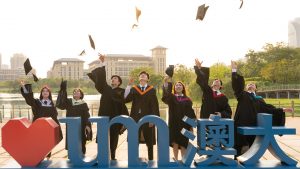
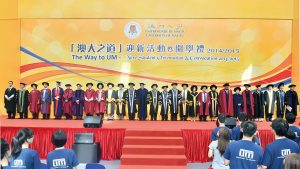
UM’s first convocation following the relocation to the new campus
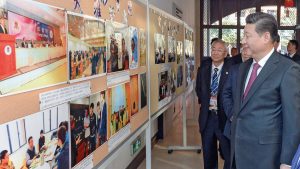
President Xi Jinping visited UM’s new campus
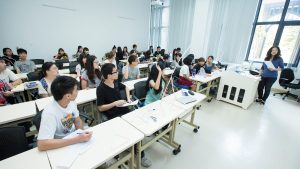
The first class on UM’s new campus
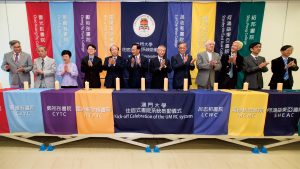
UM launched its residential college education system on the new campus to push forward its ‘4-in-1’ education model
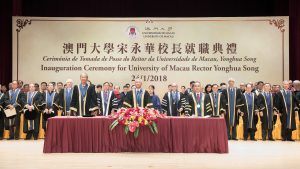
Prof Yonghua Song (1st from right) took office as the rector of UM
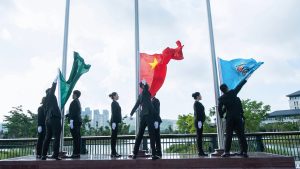
UM’s first flag-raising ceremony
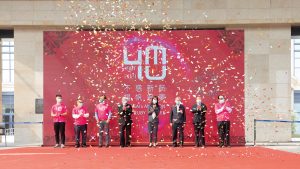
UM held a ceremony to kick off the celebrations for its 40th anniversary
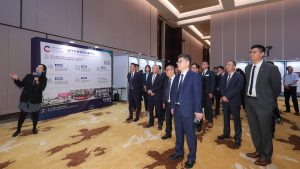
As a university that encourages innovation and entrepreneurship, UM provides aspiring young entrepreneurs with platforms to exchange ideas and explore investment and financing aven
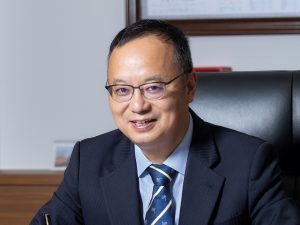
UM Rector Prof Yonghua Song
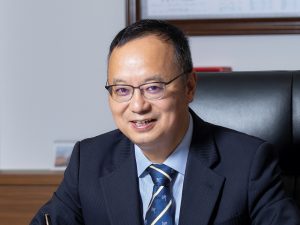
Mr Paul Pang
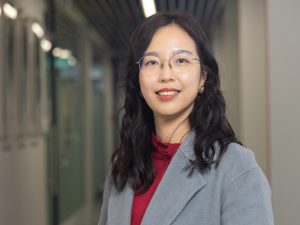
Prof Elaine Leung
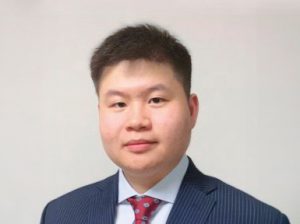
Dr Zeng Wenliang
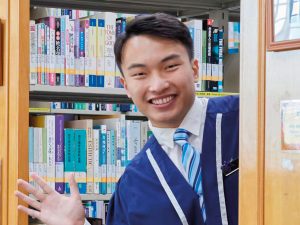
Aymo Khoo
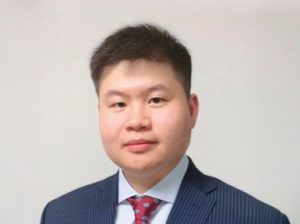
Fu Haoming
